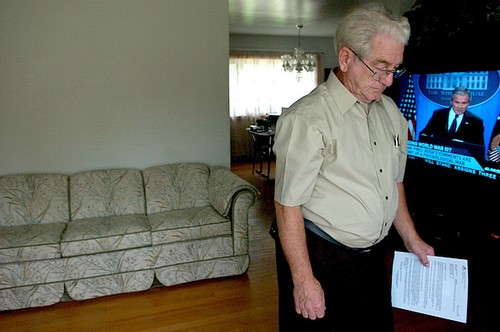|
|
Bush Adviser Sees Spending Cuts, Health Proposals
Reuters
January 18, 2006

President George W. Bush is expected to push for more cuts in spending this year in his budget proposal for fiscal 2007, White House economic adviser Al Hubbard said on Wednesday.
The proposals would be in addition to the $40 billion in spending cuts over five years that Congress has been trying to pass and hopes to send to the president when lawmakers return from a recess.
The Senate has passed the bill, which would cut spending from an array of domestic programs, including social welfare and health programs for the poor and elderly.
The House of Representatives is expected to take up the legislation, which Bush has said would keep the United States on track to cut the deficit in half by 2009.
The administration has projected a rising deficit this year which likely will exceed $400 billion. That could make it difficult for the administration to achieve its deficit reduction goal, especially if Iraq and hurricane rebuilding costs continue to mount.
Bush will outline his agenda for this year in the State of the Union address on January 31 and is expected to submit his budget formally to Congress in February.
"I can assure you this president is being very aggressive on spending
control," Hubbard said in an interview with Reuters.
He noted that non-defense, non-security discretionary spending declined in the past year. ``I think it's reasonable to expect a similar approach this coming year,'' Hubbard said.
"What the president is most concerned about are entitlements," Hubbard said, referring to Social Security, the Medicare health insurance program for the elderly and the Medicaid health program for the poor.
Those programs were growing at an "unsustainable pace" that would become even less sustainable when the ``baby boomers'' start retiring in 2008, he said.
"Medicare is a much bigger problem than Social Security ... you can't wish away the problem, it's there and the sooner we address it the
better," Hubbard said.
Bush started last year by making a big push for restructuring the Social Security retirement program but met strong resistance from the public and lawmakers.
HEALTH CARE PROPOSAL
The president's economic adviser also said Bush would likely offer proposals for lowering costs and increasing access to health care.
Hubbard noted that costs have risen for both employees and employers and that the tax code discriminates against people who pay health care expenses out of their own pockets.
"Why should we discourage people from paying for health care out of their pocket as opposed to through their insurance, the result of which is we tend to over-insure because that gives us a tax
break," Hubbard said.
That problem partly "could be fixed through the tax code," he said.
"The president views this as a big problem," Hubbard said.
"I think he'll be talking about some reforms that he thinks are very
important."
|
|



